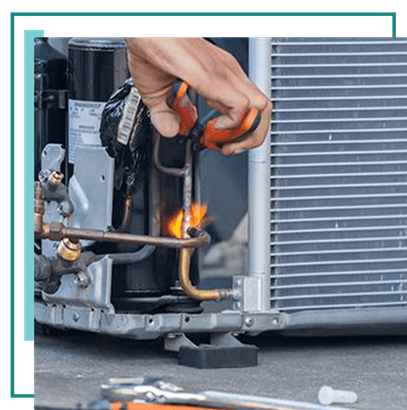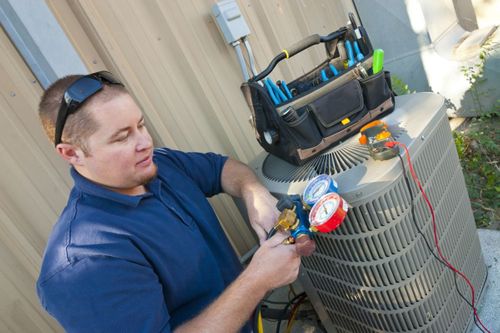Air conditioning systems rely on a refrigerant, commonly referred to as AC coolant, to cool indoor air. AC coolant is the essential substance that facilitates the heat exchange process within your air conditioning system. As warm air is drawn into the AC unit, the coolant absorbs the heat and transforms from a low-pressure gas to a high-pressure liquid. This high-pressure liquid is then sent to the condenser coil outside, where it releases the absorbed heat into the surrounding air. As the coolant cools down and turns back into a low-pressure gas, it returns to the indoor evaporator coil, ready to repeat the cycle. The proper levels and condition of AC coolant are vital for efficient cooling and maintaining a comfortable indoor environment. Regular maintenance checks and professional handling of coolant-related issues ensure that your AC system operates at its best, providing optimal cooling performance and energy efficiency.
AC Coolant
AC Coolant Refill
Over time, AC coolant levels may decrease due to minor leaks or normal usage. An AC coolant refill involves adding the appropriate refrigerant to maintain optimal cooling performance. Regular maintenance checks can help identify when a refill is needed and prevent potential issues.

Does Coolant Affect AC?
Yes, coolant, also known as refrigerant, plays a crucial role in the functioning of an air conditioning (AC) system. Coolant is responsible for absorbing heat from the indoor air and releasing it outdoors, which is essential for cooling your living space. It undergoes a continuous cycle of compression and expansion, changing from a low-pressure gas to a high-pressure liquid and back again, facilitating the heat exchange process.
The proper levels and condition of coolant are vital for efficient cooling and maintaining a comfortable indoor environment. If the coolant levels are too low or if there's a leak in the system, the AC's cooling capacity can be compromised. This can result in reduced cooling performance, longer cooling cycles, increased energy consumption, and even potential damage to the compressor – a critical component of the AC system.
If you suspect issues with your AC's coolant levels or experience a decline in cooling efficiency, it's advisable to have a professional HVAC technician assess the system. They can identify and address any coolant-related problems, ensuring that your AC operates effectively and efficiently, providing the comfort you expect during the hot months. The right refrigerant and proper levels ensure effective heat exchange, which is vital for cooling your home efficiently. Any imbalance in the coolant can lead to subpar cooling performance and higher energy bills.

AC Coolant Leak
Coolant leaks are a common issue and can result from various factors, including wear and tear, corrosion, or manufacturing defects. Detecting and repairing leaks promptly is crucial to prevent further damage to your AC system and to maintain its efficiency.

How to Add Coolant to AC Unit?
While adding coolant might seem like a simple task, it's best left to HVAC professionals. They have the expertise to assess the system's needs and ensure the correct refrigerant is used. Attempting to add coolant without proper knowledge can lead to more problems.
Can Low Coolant Affect AC?
Yes, low coolant levels can significantly affect your AC's performance. Insufficient coolant can cause the system to work harder to achieve desired temperatures, leading to energy waste and potential damage to components. Regular maintenance and addressing coolant issues promptly can prevent these problems.
AC Coolant for House
AC coolant, also known as refrigerant, is an integral part of maintaining a comfortable indoor environment within your house. It's the substance responsible for absorbing heat from the indoor air and releasing it outside, allowing your air conditioning system to cool your home effectively. The coolant undergoes a continuous cycle of compression and expansion, changing from a gas to a liquid and back again, facilitating the heat exchange process.
Ensuring that your AC coolant levels are appropriate and that there are no leaks in the system is essential for optimal cooling performance. If coolant levels are too low or if there's a leak, your AC may struggle to cool your house efficiently, leading to longer cooling cycles, higher energy consumption, and potential damage to the system.
Regular maintenance by a professional HVAC technician can help monitor coolant levels and address any issues promptly. This ensures that your AC system works efficiently, keeping your house comfortable even during the hottest days of the year. Proper maintenance not only enhances cooling performance but also contributes to energy savings and the longevity of your air conditioning system.
Coolant Loss with AC On
A sudden loss of coolant while the AC is running can lead to poor cooling performance and potential system damage. If you suspect a coolant leak or any issues with your AC, it's wise to turn it off and seek professional assistance.
AC Smells Like Coolant
If you detect a coolant smell from your AC, it could indicate a leak or a problem with the refrigerant. It's crucial to address this issue promptly to prevent any potential health hazards and further damage to the AC unit.
AC Coolant Leak Repair Cost
The cost of repairing an AC coolant leak can vary depending on factors like the location and severity of the leak, the type of refrigerant used, and the extent of the damage. Timely repairs are essential to prevent further damage and maintain your AC's efficiency.
AC coolant plays a crucial role in maintaining your air conditioning system's efficiency and effectiveness. Regular maintenance, prompt leak detection, and professional repairs are key to ensuring your AC provides optimal cooling comfort while minimizing energy consumption. If you notice any issues with your AC coolant, it's best to contact HVAC professionals like Florida Man AC for expert guidance and solutions.
